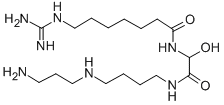Description
Gusperimus, a synthetic derivative of the antitumor antibiotic spergualin
originally isolated from Bacillus laterosporus, was introduced in Japan as a
treatment for accelerated and acute rejection reactions after kidney transplants. It
possesses strong immunosuppressive activity including suppression of
autoimmune disease, prolongation of survival of transplant allografts, induction of
transplant tolerance, reversal of allograft rejection, inhibition of antibody responses,
and suppression of delayed-type hypersensitivity. Although its activity is
comparable to other agents as monotherapy, gusperimus in combination therapy
(such as with cyclosporine A) has been reported to exhibit exceptional activity for
prevention of transplant rejection and to induce long term tolerance. The mechanism
of action appears to be due to inhibition of differentiation and proliferation of effector
cells, including cytotoxic T cells and antibody producing B cells. Gusperimus is also
in clinical trials for the treatment of graft rejection, multiple sclerosis, systemic
lupus, diabetes mellitus, rheumatoid arthritis, nephrosis, and as an anticancer
agent.

